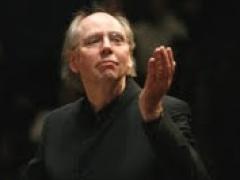
Andrew Parrott - a personal appreciation
“The thing about Andrew,” the ubiquitous violone-player Francis Baines once observed, “is that he’s not a bastard.” One might be excused for supposing this to be an entry-level qualification for such a competitive profession, but that would, alas, be an error. Even a cursory acquaintance with the world of music is enough for one to be aware that in the annals of human frailty a disproportionate number of transgressions can be traced back to the conductor’s rostrum.
While I imagine most readers of this encomium would not quibble with Francis’s assessment, it does not in itself explain Andrew’s large and notably constant circle of colleagues and admirers. What is it about Andrew, the invitation to contribute to this volume prompted me to reflect, that inspires such steadfast friendships?
Of course on one level we are proud merely to be acquainted with someone who has made such a profound impact on our sound world, whether it’s a question of pitch relations in Monteverdi’s 1610 Vespers, the voicing of the Bach Passions or scraping away the barnacles from our ‘traditional’ carols. Then there is The Pursuit of Musick, impressive for the audacity of the concept and the sheer amount of scholarly footslogging that it must have entailed; some of us doubted that, like Casaubon’s The Key to All Mythologies, in its intention to be comprehensive it would ever actually issue from the press. And at a time when large corporations have more and more of a stranglehold over our lives, we admire his resolve to stand his ground and refuse to kowtow to the demands of the stony-faced money men who now run publishing houses and recording companies.
We value Andrew as a stimulating and witty conversationalist with a panorama of interests, windmill arms flailing and a mind fizzing with ideas that come too fast to articulate, making it difficult for him to reach the end of a sentence without becoming mired in a morass of subordinate clauses, provisos, afterthoughts, parentheses, riders and suchlike. And then there are his many quirks, that have given rise to mythologies of their own. Does he really need, even on a short trip, so many large and weighty suitcases, that turn out to be a sort of travelling library? And did someone really once pass him giving instructions to the college porter and catch just the two words, “ . . . and ninthly . . . ”?
We remember what exceptionally generous and brilliant hosts Andrew and Emily have been over the decades – any event, birthday or anniversary was seized upon as an excuse for a celebration, going back to the musical extravaganza that was their wedding all those years ago. Garden parties for all the generations in Stanton St John. Lunches at country inns and boat trips on the Thames. Dinners in the Oxford High with scores of guests. And of course the Symposiums, those festivals of scholarship, recital, conversation, feasting and drinking, remarkable these days for being independent of any large organisation or institution, and particularly well-named for someone at the centre of a circle of scholars and performers in the manner of a latter-day Plato.
At the most recent of these, which was also the launch of The Pursuit of Musick, it struck me that at all these gatherings there was a constant cast of friends going back half a century or more to student days. People I had sung with in the seventies. Newly-weds who were now grandparents. Others I had not seen for such a long time that the appropriate greeting was not ‘Good morning’ but ‘Good heavens!’ I thought this said a lot about the man. Who of us can claim to have such loyalty to and from friends? Was this what Francis really meant? Could this outstanding trait be the key to all Parrott mythologies?
Andrew van der Beek
Payrignac, St Andrew’s Day 2023
©2023